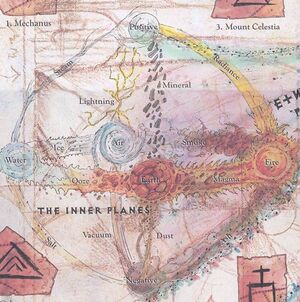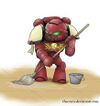Element
 This page is needs images. Help plz. This page is needs images. Help plz. |
An Element is a part of a whole, and it is usually an irreducible, fundamental part. For instance, a circuit element, like a resistor or capacitor, cannot be broken up into a collection of other circuit elements, and an elementary particle is not made up of other particles (until we figure out how to split it, anyway -- the word "atom" comes from the Greek word for "indivisible," but obviously that didn't last).
Most systems of magic will include "elemental magic" of one kind or another, based on the notion that the universe is composed of a few elemental forces (exactly what these elements are depends on the setting), and that a person with the right combination of natural talent and training can wield these raw forces as tools and weapons. Some settings include "elementals," creatures which are made of or otherwise embody one of the elements, and which may be summoned and bound by mages, or may be intelligent in their own right.
Once you open the door to elemental magic, you inevitably get to issues of balance. Often, the elements play a big game of rock-paper-scissors with each other, with each element being strong and/or weak against the others; for example, dousing a fire elemental or fire mage will leave him sputtering and steaming.
Greek Elements

The most familiar system of elements to Western audiences is probably the classical Greek system of fire, air, water, and earth. Almost all elemental magic systems include at least these four. If the elements are arranged in that order around a square, then they will naturally form pairs of opposing (and thus balancing) elements, as well as transitions between an neighboring elements, which might be manipulated by two elemental mages working together (for example: earth + water = mud) or fought over by two opposing elemental mages. Sometimes there will be a fifth element thrown into the mix, like "quintessence" (which is just Greek for "fifth element") or "heart" (if you're trying to summon Captain Planet).
In the Dungeons & Dragons Planescape campaign setting, there are Elemental Planes corresponding to each of the four classical elements, Paraelemental Planes at the boundaries between neighboring Elemental Planes (Smoke between Fire and Air, Ice between Air and Water, Ooze between Water and Earth, and Magma between Earth and Fire), and Quasielemental Planes at the boundaries between the Elemental Planes and the Positive and Negative Energy Planes:
| Air | Earth | Fire | Water | |
| Positive | Lightning | Mineral | Radiance | Steam |
| Negative | Vacuum | Dust | Ash | Salt |
Wu Xing
The Chinese elements or "changes" are probably the other major system which inspires magic systems today. The five elements are, in order, Fire, Earth, Metal, Water, and Wood. Each element "creates" the next in the sequence, "destroys" the element two steps over, and "insults" the element three steps over.
Japanese Elements
Settings that feel like doing things differently may use the Japanese elements of Earth, Water, Fire, Wind, and Void (or "spirit"). The Legend of the Five Rings uses them.
Magic: The Gathering
Magic: The Gathering doesn't really have "elements" in the sense that most people think of them, but the five colors of magic (white, blue, black, red, and green, arranged in a pentagon or wheel) do behave in a similar way. Each color's "allies" are its neighbors, while the colors opposite are "enemies."
Real Life
The list of chemical elements has 118 members in it and keeps growing as more atoms get smashed together. This would not make for a very fun system of magic. The list of elementary particles isn't much better -- the standard model has 16 of them, and that's before we start getting into gravity, string theory, supersymmetry, and the Higgs boson. There are only four fundamental forces, though, which is a manageable number. These forces are gravity, electromagnetism, the weak nuclear force, and the strong nuclear force. They're ludicrously imbalanced, though -- gravity is really the only one that matters on the planetary scale, but EM becomes really important for everything smaller, and the strong and weak nuclear forces only matter at the subatomic scale. Never mind the question of what a strong-nuclear-force elemental would look like.
